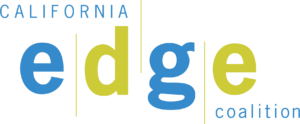
Call to Action: Support Education & Workforce Development Bills Pending in Policy Committee!
Please join our advocacy efforts to support education and workforce development bills pending before various policy committees. Provided below is a list of pending bills, brief descriptions, and deadlines to submit support letters, along with links to the full bill text and fact sheets. You will also find a link to advocacy tools with letter templates, sample emails, phone call scripts, and social media posts you can modify and use.
View the livestream Assembly committee hearings here and the Senate committee hearings here.
Follow us on Twitter/X and LinkedIn for the latest bill updates!
For questions, contact Jason Henderson, EDGE Policy Analyst, jhenderson@caedge.org.
AB 42 (Bryan) Simplifying CalWORKs/CalFresh. This bill would ensure all student grants, loans, fellowships, and scholarships are excluded from income calculations for CalWORKs and CalFresh recipients, helping underserved Californians access the full support needed to complete education and training programs. Factsheet Advocacy Tool
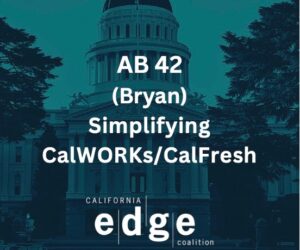
AB 323 (Fong) Strong Workforce Program Fund Authorization. This bill would authorize Strong Workforce Program (SWP) funds to support students and employers in offering paid work-based learning opportunities that enhance employability and job placement. Letters due by Friday, June 20 at 12 pm. Factsheet Advocacy Tools
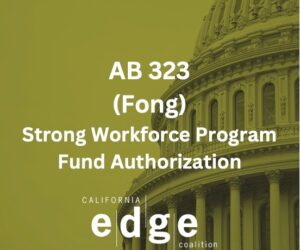
AB 537 (Ahrens) California College Promise for All. This bill aims to modify the eligibility criteria for the California College Promise program, enabling part-time community college students to qualify for the enrollment fee waiver. This proposal ensures more students can access the financial resources needed to succeed. Letters due by Friday, June 20 at 12 pm. Factsheet Advocacy Tools
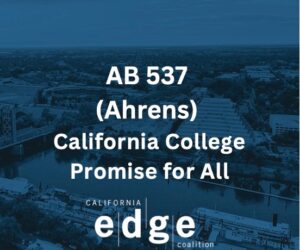
AB 731 (Fong) College and Career Access Pathways – Dual Enrollment Partnerships. This bill removes key barriers to make CCAP dual enrollment more accessible and equitable for all students. It simplifies the application process, eliminates the need for principal approval, and offers flexibility on the 15-unit cap. Letters due by Friday, June 20 at 12 pm. Factsheet Advocacy Tools
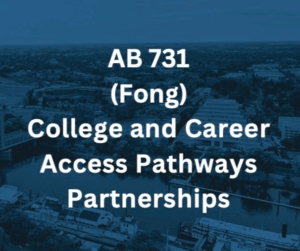
SB 275 (Smallwood-Cuevas) Eligible Training Provider List. This bill streamlines the eligibility process for training providers on the Eligible Training Provider List (ETPL) by shifting from annual to biannual documentation, aligning with federal standards. This reduces administrative barriers, keeps programs accessible during review, and supports workforce development in California. Letters due by Wednesday, June 18 at 5:00 pm. Factsheet Advocacy Tools
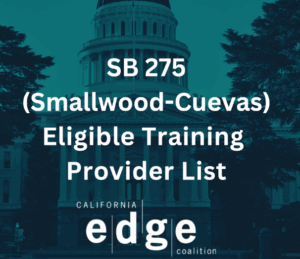
SB 638 (Padilla) California Education and Workforce Development Coordinating Entity. This bill establishes the California Education and Workforce Development Coordination Entity as the statewide body for career technical education and workforce development. The bill introduces statutory changes to GovOps aimed at creating a more equitable, integrated, and responsive education-to-employment system in California.
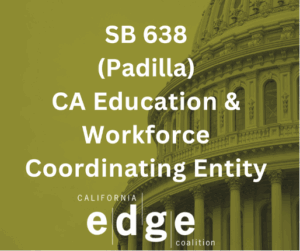
*Please note bill hearings are subject to change.
We invite you to sign on to the California EDGE Coalition’s 2025-26 Policy Agenda and help us demonstrate strong, unified support for policy changes and investments that drive economic mobility in communities historically excluded from California’s prosperity.
Our agenda outlines a bold vision to:
- Empower Opportunity Youth through innovative education and workforce training opportunities.
- Expand Access to Education and Skills Training for underserved communities.
- Enhance Career Technical Education and Apprenticeships to meet the demands of today’s job market.
- Promote Digital Equity by ensuring access to technology and online learning opportunities.
- Leverage Data for Smarter Policy Decisions that close equity gaps and guide strategic investments.
Join us by signing on here. By signing on, you’ll strengthen our collective voice as we engage with the California Legislature, administration, and key decision-makers to champion these shared priorities. You can view the full policy agenda here.
Together, we can advance shared prosperity throughout California. For questions or more information, please contact Jason Henderson, EDGE Policy Analyst, at jhenderson@caedge.org
